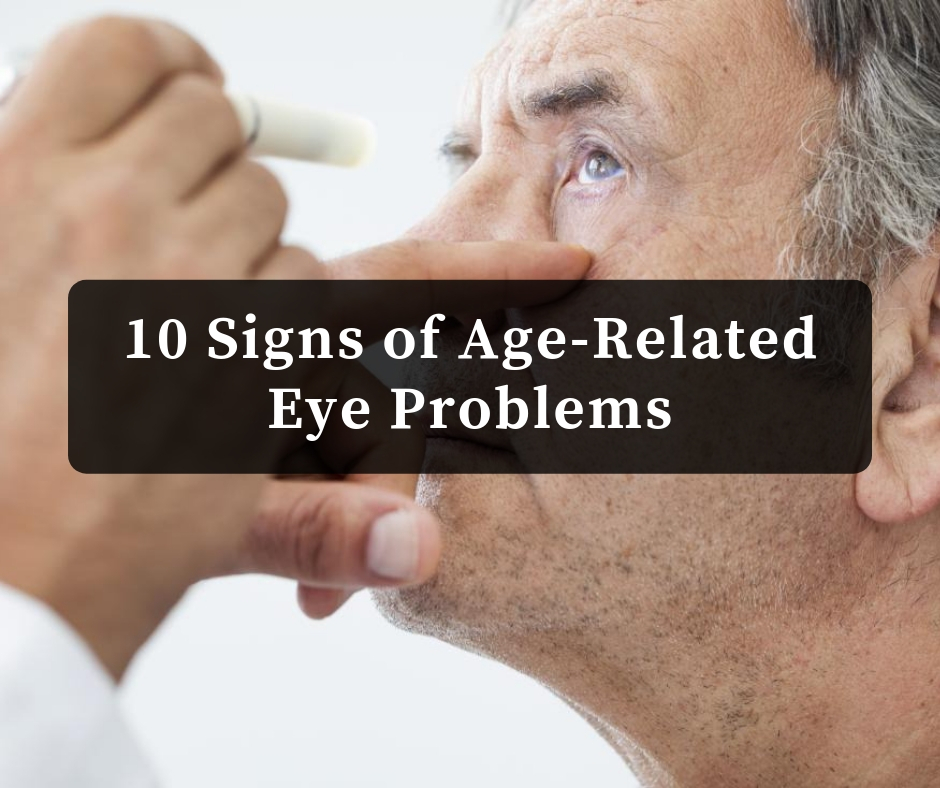
Regular eye exams are the very best way to avoid vision problems, even as you grow older. If you haven’t had an eye exam in over a year, schedule a visit with an eye doctor near you. Being aware of certain warning signs also can help you take appropriate steps to maintain your eyesight, particularly if vision symptoms occur suddenly. In many cases, such as with a detached retina or rapid onset of glaucoma, prompt intervention is essential to avoid or minimize permanent vision loss.
While many eye problems can occur at any age, they often are more common in older individuals. Unfortunately, aging also increases your risk for certain types of sight-threatening eye conditions that can lead to blindness.
The following signs and symptoms can indicate a medical emergency or an urgent condition that could cause significant vision loss over time. In most cases, you should see your eye doctor as soon as possible if you experience:
A sudden onset of many spots and floaters in your field of vision.
Usually, eye floaters are due to a benign, age-related condition called vitreous detachment. This occurs when the eye’s gel-like interior liquefies and separates from the retina, the light-sensitive inner lining of the back of the eye. But a sudden onset of spots and floaters also can be caused by a serious, sight-threatening tear or detachment of the retina. If you suddenly see a shower of spots and floaters, see an eye doctor immediately.
A sensation that a dark curtain has settled across your field of view.
This could be caused by a retinal detachment, which occurs when the retina separates from the underlying layer of nourishing blood vessels (choroid). If the retina is not reattached within hours, vision loss can be permanent.
Sudden eye pain, redness, nausea and vomiting.
These symptoms can signal a sudden (acute) attack of narrow-angle glaucoma, which can permanently damage the eye’s optic nerve. Immediate treatment is required to prevent permanent vision loss.
Double vision, double images or “ghost” images.
Double vision can be caused by many eye conditions. In some cases, double vision also can signal an underlying health emergency such as a stroke. If you have a sudden onset of double vision, see an eye doctor immediately.
Sudden blind spot in one eye.
If you are over 60, your chance of developing a macular hole in the most sensitive part of the retina. Because macular holes can worsen and cause permanent loss of vision, it’s important to see an eye doctor immediately if you notice a gray area or blind spot when viewing objects with one eye.
A narrowing of your field of view.
A reduction of your ability to see objects off to the sides could be a sign of glaucoma. Without intervention, peripheral vision loss could continue to worsen, leading to tunnel vision or even blindness.
A gray, blurry or distorted spot in the center of your visual field.
These symptoms may be caused by macular degeneration (AMD), a leading cause of blindness among older Americans. In the past, there was no effective treatment for macular degeneration. But today, new medical treatments sometimes can halt or limit AMD-related vision loss.
Poor night vision, halos around lights or less vivid color vision.
These vision changes may be due to cataracts. Cataracts tend to worsen gradually over time and are not a medical emergency. Nevertheless, as your eye’s natural lens continues to cloud with aging, your vision will continue to deteriorate unless you have cataract surgery that replaces your cloudy lens with a custom intraocular lens (IOL). If you wait too long for cataract surgery, you increase your chance of complications such as glaucoma. Also, if cataract surgery is postponed too long, the cloudy lens can harden and become more difficult to remove.
Blurred vision and gray areas in your visual field.
If you have diabetes, these vision problems may be due to the onset of diabetic retinopathy. Regular eye exams are essential for diabetics, particularly if you are over age 60. By evaluating the condition of your retina, your eye doctor can provide valuable information to your general physician about the control and severity of your diabetes.
Red, “scratchy,” irritated eyes.
These signs and symptoms are most commonly due to dry eye syndrome. Dry eyes usually are more of a nuisance than a sight-threatening condition. But symptoms can be severe, particularly as you grow older and your body produces fewer tears or your tear chemistry changes. Consult your eye care practitioner for advice about remedies, which may include over-the-counter or prescription eye drops.

























